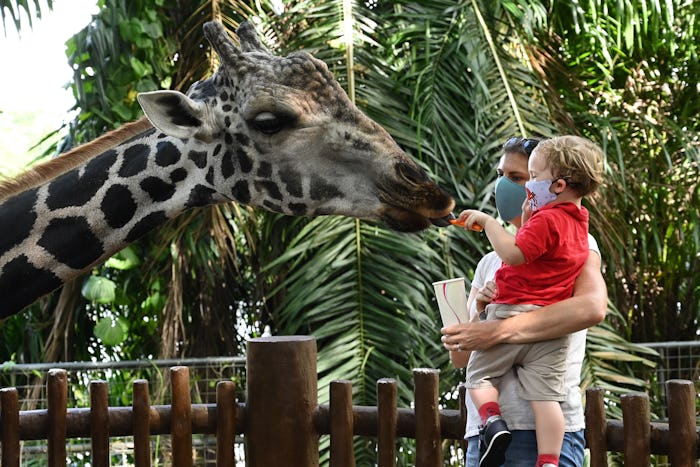Life

What Infectious Disease Experts Want You To Know Before Taking Your Kids To The Zoo
After months of quarantining mostly indoors, you’re probably desperately seeking some sort of safe outdoors activity for your family. A visit to the zoo might seem like the perfect way to spend a summer day (and, you know, get out of the house). But before you head off to see the lions, tigers and bears (oh my!), there are a few things you should know before you go to a zoo. That way, you might actually get to enjoy the experience.
“Going to the zoo in the old normal often involved being around a lot of other people,” Dr. William Schaffner, an infectious disease specialist and public health expert, tells Romper in a phone interview. But in this new normal, it’s a good idea to prepare your child for the ways in which seeing the sea lions might differ from previous visits. “We ought to have a conversation with our kids about how it’s going to be different, starting with everyone wearing masks, and using hand sanitizers several times during the visit,” advises Dr. Schaffner.
Thing is, not all exhibits are outdoors. So if your child desperately wants to see the bats or the butterflies, you’ll need to formulate an indoor exhibit entrance and exit strategy. “If you’re going in to see a tiger, make sure that you’re spacing yourself out,” Dr. Syra Madad, pathogen preparedness expert and epidemiologist, tells Romper over the phone. “Let the first cohort of people go in, wait, and then go in afterwards. Your goal should be to always safely distance with your kids.” If you want to get a guesstimate on the indoor head count, you can always take a peek inside to see how many people are already in there.
Of course, a walk on the wild side means that your kid is bound to be ravenous at some point. But whether you pack snacks or hit the concession stand, be sure to stay safe at all times. “Just wait in line with a six foot distance, and look behind you to make sure that no one is crowding you,” says Dr. Schaffner. If someone is getting a little too close for comfort, just "ask them casually if they would give you a little space and give them a smile,” he says. But before you plunk down your tray, look for a more secluded spot that’s not too close to other zoo visitors.
After walking around the zoo for a while, your child is going to get sweaty, which means it might not be a bad idea to pack a backup mask. “The likelihood is that your child will be sweating, and if it becomes wet or damp due to oral secretions collected in the mask, you’ll need to change it out,” says Dr. Madad. “If you’re going to be indoors at any point, though, you and your family need to wear a mask.” And if your child needs a breather and wants to take it off, make sure that you’re outside, where there’s better ventilation, and away from other visitors.
You might even want to time your trip to the zoo for earlier or later in the day (and during the week, if possible), when there won’t be so many people trying to squeeze in to see the giraffes. After all, your child will probably have a better time when it’s not as crowded — and so will you. Crowded or not, for now you should forget about feeding the animals. “You don’t want to touch anything that is a commonly-touched area or surface,” says Dr. Madad. “Think about it: you’re going to put your hand in the same bucket as someone else, but if you do that, you’re going to have to practice hand hygiene right away or go wash your hands.”
And when plans have to change for whatever reason, you can always take your child to the zoo virtually. There are plenty of zoo sites you can visit with your child so they can see animals up close and personal. “On a rainy day when you can’t see elephants or tigers or other interesting animals, this is a little trip you can take with them,” says Dr. Schaffner.
For the most part, a trip to the zoo should be fairly safe if you practice proper social distancing and wear a mask. That way, you can see all of the animals, and the only thing that your child will be bringing home is some amazing memories, maybe a slight sunburn — and nothing else.
If you think you’re showing symptoms of coronavirus, which include fever, shortness of breath, and cough, call your doctor before going to get tested. If you’re anxious about the virus’s spread in your community, visit the CDC for up-to-date information and resources, or seek out mental health support. You can find all of Romper’s parents + coronavirus coverage here.
Experts:
Dr. William Schaffner, infectious disease specialist and public health expert
Dr. Syra Madad, pathogen preparedness expert, epidemiologist, and Senior Director of the System-wide Special Pathogens Program at NYC Health + Hospitals where she is part of the executive leadership team overseeing New York City's response to the Coronavirus disease